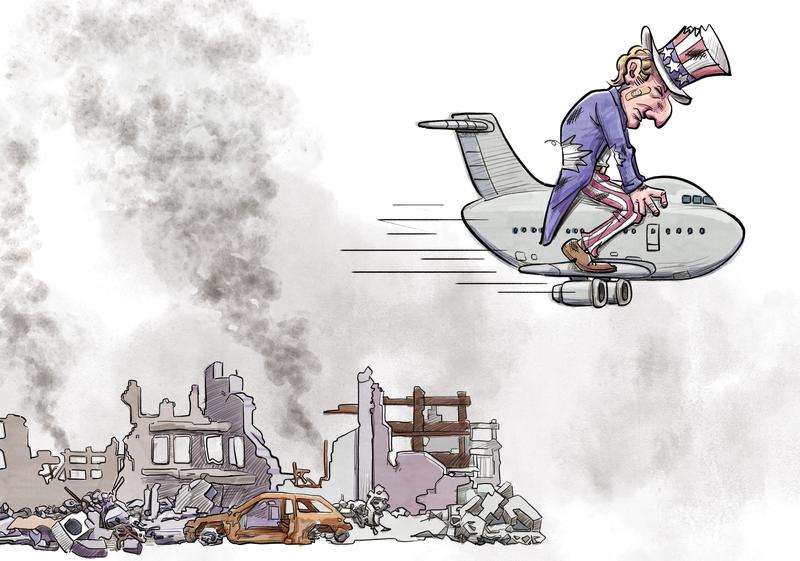 (JIN DING / CHINA DAILY)
(JIN DING / CHINA DAILY)
The lightning speed at which the Taliban have seized power in Afghanistan despite the US' almost 20-year "nation-building" exercise has made US President Joe Biden the object of mounting criticism. The Taliban's return to power has also tarnished the United States' image, especially because, despite being a leading foreign policy expert, Biden failed to read the situation.
For any US president since George W. Bush, withdrawing troops from Afghanistan would have been a historic decision but one always fraught with political risks. While in office, previous president Donald Trump negotiated a deal with the Taliban in 2020 to withdraw US forces from Afghanistan by May 1, 2021.
The deal was aimed at boosting Washington's Indo-Pacific strategy-by transferring the troops in Afghanistan to the US Indo-Pacific Command-and Trump's 2020 presidential campaign. But Trump passed on the responsibility of the actual withdrawal to Biden, who extended the pullout deadline from May 1 to Aug 31.
Biden's decision was also necessitated by his own strategic concerns. Since the Biden administration has been following Trump's national security strategy, which focuses on "great power competition", it had to correct the "mistakes" committed by earlier administration's in the global "war on terror". And for Biden, pulling the US troops out of Afghanistan was correcting one of those mistakes.
Besides, Biden is desperate to garner more support in order to win the midterm elections next year by showing the voters that he can take "tough" decisions for the benefit of the US. So he had to get the infrastructure bill passed and withdraw the US troops this year to blunt some of the edge the Republicans have in the midterm elections. This is important, because the loss of seats in the midterm elections could mean the Democrats losing majority in both the Senate and the House of Representatives, which will deal a big blow to Biden's domestic and foreign policies.
That the Afghan government forces were unwilling to fight the Taliban forces, with many of them even abandoning their posts, is seen as a devastating failure of the US intelligence community to study the situation on the ground or understand the psyche of the Afghan people. While the Biden administration is rigid in its strategic decision-making but reluctant to implement policies, which incidentally led to the chaos in Afghanistan, the US diplomatic security team is better at making plans than handling emergencies.
Biden has defended his decision to withdraw the US forces despite the intense political backlash. For example, on Aug 16, he said: "I have learned the hard way that there was never a good time to withdraw US forces."
Many have said the withdrawal from Afghanistan is "Biden's Saigon", because the photographs of a helicopter flying over the US embassy in Kabul on Aug 15 apparently to evacuate embassy staff are being compared with similar images from the fall of Saigon in 1975, which ended the Vietnam War.
Given the series of miscalculations that have damaged the US' credibility, the Biden administration is likely to attach greater importance to its Indo-Pacific strategy, including the Quad (US, India, Japan and Australia) and the "democracy" summits.
Yet the withdrawal does not mean the US will have nothing to do with Afghanistan any more, for it is likely to use policies and ploys to oppose the Taliban, and retain its geopolitical influence in Central Asia.
But irrespective of what Biden wants to do in the future the current situation in Afghanistan has dealt a big blow to the US' diplomatic strategy. The hasty withdrawal from Afghanistan indicates the limits of US hegemony, and shows that despite being the sole superpower in the world, it cannot achieve all its strategic goals, whether in Afghanistan or other places. The photographs and video clips from Kabul paint a sorry picture of US' fading hegemony in a fast-changing world that is moving from unipolarity to multilateralism.
The chaotic withdrawal has also made allies wonder whether the US is still reliable. It gives lie to Biden's promise to regain Washington's "prime" position in international relations and make allies more confident that the US will fulfill its promises. And if the US can't consolidate its leadership position among its allies, it cannot succeed in its "great power competition" strategy.
The Afghan pullout also shows the failure of US to export its "democratic" and other values to other countries. Washington's most ambitious goal was to spread US-style democracy in Afghanistan, but the collapse of the Afghan government and capitulation of its army show that US values cannot fulfill the Afghan people's needs nor meet their expectations. So the US' failure in Afghanistan should also be seen as the failure of US-style democracy.
If the Biden administration still tries to use "ideological threats" to unite them against third parties, it would be promoting Cold War mentality.
Unfortunately, the hasty US withdrawal could encourage terrorist and extremist outfits in some countries in the Middle East and Central Asia to intensify their activities. Therefore, the whole world should take measures to prevent a possible resurgence of terrorism and militancy, because that could threaten not only the US' national and overseas interests, but also the security of other countries. The world also needs to be prepared to deal with a more self-obsessed US in the era of declining American hegemony.
The author is a researcher at the National Academy of Development and Strategy, Renmin University of China.
The views don't necessarily reflect those of China Daily.



